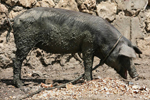Landmark Sentence for Agrochemical Contamination in Cordoba | Dos condenas y una absolución en el primer juicio por el uso de agroquímicos en Córdoba
By Kate Beioley, Argentina Independent | Staff, Los Andes. Two men, rural producer Francisco Parra and chemical-application person Edgardo Pancello, were sentenced to three-year prison terms for use of the agrochemicals endosulphin and glyphosate in the barrio of Ituzaingó Anexo. So far, 200 cases of cancer have been discovered in the barrio, 100 of these fatal. (English | Spanish)
Continue reading →






